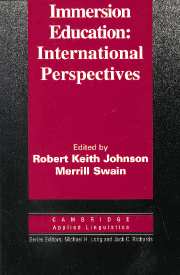Book contents
- Frontmatter
- Contents
- List of contributors
- Series editors' preface
- Preface
- Chapter 1 Immersion education: A category within bilingual education
- I IMMERSION IN A FOREIGN LANGUAGE
- II IMMERSION FOR MAJORITY-LANGUAGE STUDENTS IN A MINORITY LANGUAGE
- Chapter 4 “Late, late immersion”: Discipline-based second language teaching at the University of Ottawa
- Chapter 5 Immersion in Finland in the 1990s: A state of development and expansion
- III IMMERSION FOR LANGUAGE REVIVAL
- IV IMMERSION FOR LANGUAGE SUPPORT
- V IMMERSION IN A LANGUAGE OF POWER
- VI LESSONS FROM EXPERIENCE AND NEW DIRECTIONS
- Index
Chapter 4 - “Late, late immersion”: Discipline-based second language teaching at the University of Ottawa
Published online by Cambridge University Press: 05 October 2012
- Frontmatter
- Contents
- List of contributors
- Series editors' preface
- Preface
- Chapter 1 Immersion education: A category within bilingual education
- I IMMERSION IN A FOREIGN LANGUAGE
- II IMMERSION FOR MAJORITY-LANGUAGE STUDENTS IN A MINORITY LANGUAGE
- Chapter 4 “Late, late immersion”: Discipline-based second language teaching at the University of Ottawa
- Chapter 5 Immersion in Finland in the 1990s: A state of development and expansion
- III IMMERSION FOR LANGUAGE REVIVAL
- IV IMMERSION FOR LANGUAGE SUPPORT
- V IMMERSION IN A LANGUAGE OF POWER
- VI LESSONS FROM EXPERIENCE AND NEW DIRECTIONS
- Index
Summary
Introduction
Canada, a vast country with a scattered population of more than twentyseven million, is home to speakers of many languages, including Amerindian communities and large urban immigrant communities from diverse language backgrounds. But English and French, the two official languages, are predominant. The shared history of these two languages dates from the period of early European settlement, and their current distribution reflects both that initial settlement and subsequent internal migrations. English – the native tongue of some seventeen million Canadians (62%) – is the majority language in most regions outside the province of Quebec, and is the language of a significant minority community of almost 670,000 in Quebec (approximately 10%). French is the language of just under 25% of Canadians, including 82%, or more than five and a half million, of Quebec's population of some seven million. It is preeminent in all aspects of public life in that province, and has long been and remains by far the second most important language outside Quebec in political, cultural and business communication across Canada. In 1969 English and French were accorded the shared status of official languages in Canada's federal government institutions and Parliament, guaranteeing Canadians throughout the country access to federal government services in both languages. Provincial governments, however, with only one exception, officially function in the majority language of their population: English in eight of the provinces and the territories, and French in Quebec.
- Type
- Chapter
- Information
- Immersion EducationInternational Perspectives, pp. 65 - 84Publisher: Cambridge University PressPrint publication year: 1997
- 13
- Cited by

